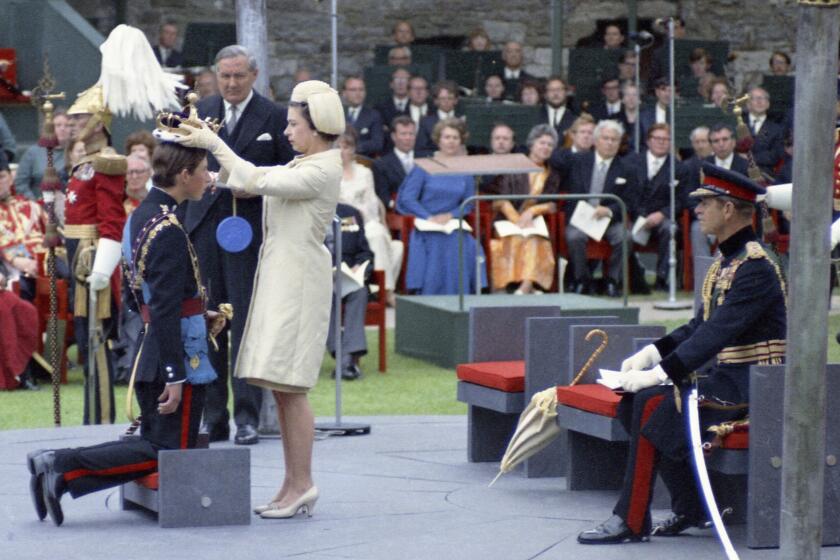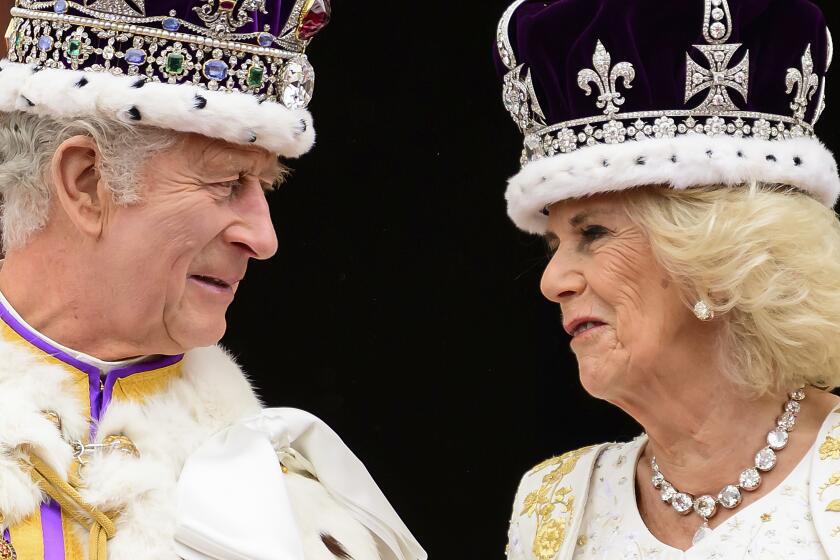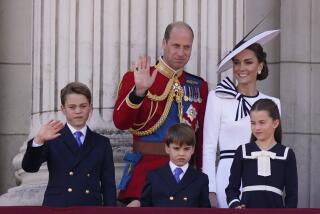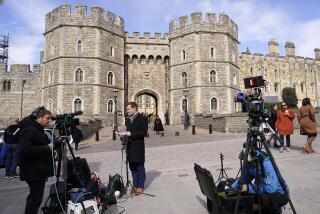King Charles who? All eyes will be on Harry during the coronation
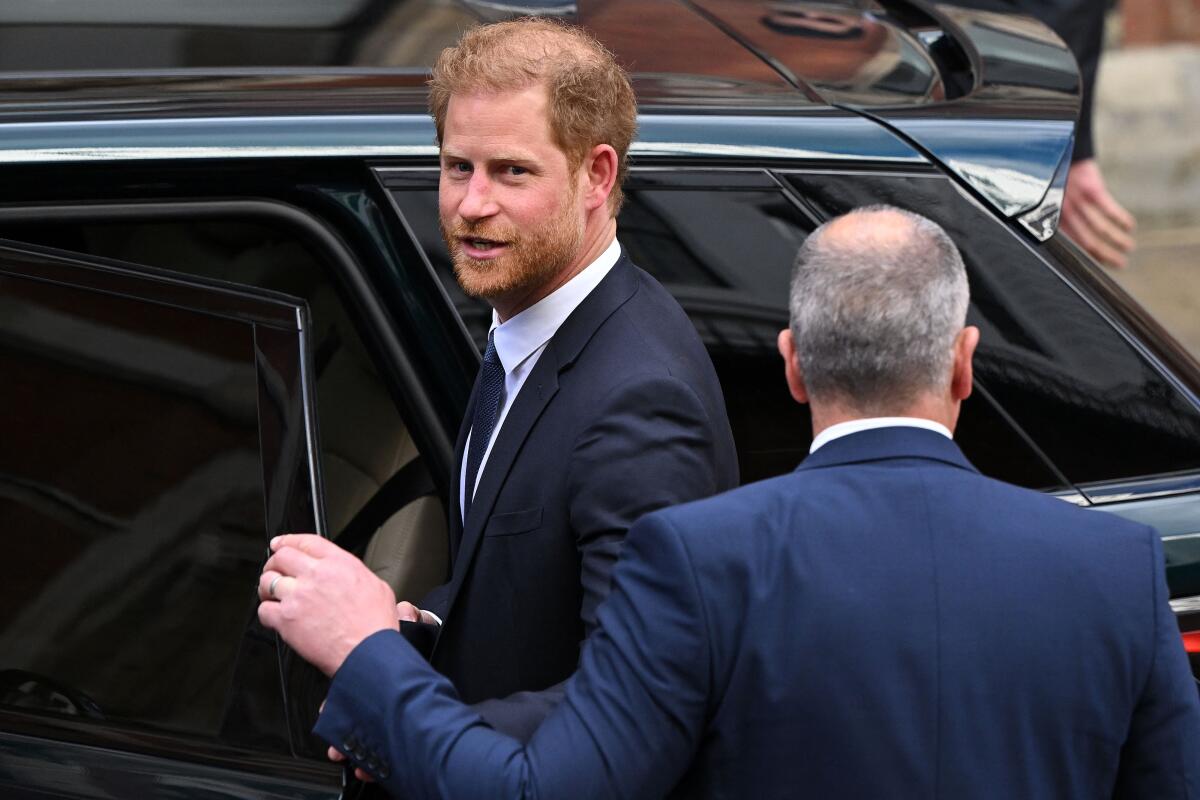
LONDON — There won’t be a HarryCam at the coronation of King Charles III in Westminster Abbey on Saturday — even though much of the world may be tuning in for a glimpse of the Duke of Sussex.
On the day of Charles’ long-awaited glory, the man who’s had the longest wait to become Britain’s king may have to share the front pages with every little twitch and shrug of his own discontented younger son sitting somewhere in the church — but where? And sitting with whom? Is Harry catching his father’s eye? Avoiding his brother’s? Shades of Charles’ late ex-wife, Diana, whose glamour and drama overshadowed Charles the prince.
In a TV interview, Harry recalled that Charles once begged his sons: “Please, boys, don’t make my last years a misery.”
But isn’t that part of the public’s fascination?
For the record:
1:03 p.m. May 5, 2023An earlier version of this column said Prince Harry and wife Meghan’s son, Archie, was born in California. He was born in London.
More than three years after Harry and Meghan’s uncoupling from the royal family, and their launch of charitable undertakings and money-making projects — a tell-all book, TV programs, and launching it all, that Oprah Winfrey interview — the Sussexes are now self-exiled in Montecito with their children, Archie and Lilibet.
Their fans and supporters regard them as heroic figures — wronged by a racist family and nation — for revealing ugly things about the royals, naming names and incidents.
Their critics find them to be whingeing — that British word for whining — and acting impetuously, putting the worst spin on things, when they might instead have used their global profile to leverage change within the family and the institution that is the House of Windsor. They might have become a kind of viceroy and vicereine to the British Commonwealth nations, whose populations are largely people of color, and which are deciding whether to stay in the British “family” under King Charles III.
Not just an English affair: King Charles III’s formal accession to the throne points up restiveness in Scotland, Wales and Northern Ireland.
But two things are simultaneously possible: that the Sussexes are right in many of their critiques of retrograde ideas and practices in the royal family and the royal firm, and that their critics are also right about them being tiresome, preachy, impatient, and “oversharing.”
There’s more polling about the popularity of Harry and Meghan than about some presidential candidates. One week their positives are up a bit; the next week, they’re down. At the moment, that percentage is consistently below 50% except among some Americans and younger people in general. Among senior royals, only the disgraced Prince Andrew ranks lower, significantly so.
The crowning of King Charles III — code-named Operation Golden Orb — was a display of heritage, tradition and spectacle unmatched around the world.
Joe Little, the managing editor of Britain’s “Majesty” magazine, said that Britons over 40 are deeply disappointed in the Sussexes and think they were disrespectful to the elderly queen, but the under-30s think the Sussexes were treated badly by the royals. As a consequence these younger Britons think less of the monarchy itself, a red flag for the new king. Still, Little says, “it’s a wise move on Harry’s part to be there on his father’s big day. Whether that leads to further restoration of normality, who knows. It’s a step in the right direction.”
Prince Harry will be attending Saturday’s coronation without his wife, who chose to stay home for the fourth birthday of their son, Prince Archie.
Andrew Morton, the author of the original explosive royal tell-all, “Diana: Her True Story” and “The Queen: Her Life,” says the birthday party “is a way of absolving Meghan from coming to the function. I think it’s one up from ‘She’s washing her hair.’ “
What Harry does or doesn’t do at the coronation affects the family, but not the monarchy, Morton says. The chain-reaction that Queen Elizabeth II’s sister, Margaret, set in motion at Elizabeth’s coronation in 1953 was “far more dangerous a precedent than the fact that Harry said his brother was not nice to him one day.”
The photo of Princess Margaret flicking a piece of fluff off the lapel of the divorced commoner she was secretly in love with put the young monarchy in crisis: Should the young princess be allowed to marry the man she wanted against the beliefs of the head of the Church of England — her own sister? Or keep Margaret from following her heart? (The couple did not marry; instead Margaret married Anthony Armstrong-Jones, who was later created Earl of Snowdon.)
Millions will be watching Harry — his arrival, his precedence, whether he bows “to the new king and the queen he accuses of throwing him and his wife to the media wolves,” whether he’s invited onto the Buckingham Palace balcony and if he is, whether he will take a pass. “There always will be people who think that Harry was done badly by,” says Morton, “but there will also be people who think Harry and Meghan went too far in the criticism of the individuals and the institution.”
Comparisons have been made to the Duke of Windsor, who was King Edward VIII when he abdicated in 1936 to marry a twice-divorced American woman, Wallis Simpson. But that was a shattering constitutional crisis because he was the king, something Harry will never be. Wallis was not invited to the funerals of the abdicated king’s brother, George VI, nor his mother’s, Queen Mary. Windsor did attend, and hurried right back to his wife afterward, as Harry is expected to do. Meghan was invited to both the Queen’s funeral and the coronation.
“If anything,” Morton says, “Harry’s whistle-stop presence is a sign that Great Britain Inc. is very much in the rearview mirror of TRH Meghan and Harry.”
Sally Bedell Smith is the bestselling biographer of Queen Elizabeth II, and of Charles as Prince of Wales, and her current book is “George VI and Elizabeth: the Marriage That Saved the Monarchy.” People will be watching for Harry, she says, “lip-readers, body language experts. He won’t be going anywhere near William and Kate and the kids.”
But Smith, adds, “There’ll be a shock at his arrival, but he’s not going to be coming in the Great West Door with the King and Queen and the Waleses.” That procession is for working members of the royal family. “Instead, he’ll likely come and go with his cousins, Princesses Beatrice and Eugenie,” Smith said.
Even as a nonworking royal, Harry is still a counsellor of state to the new king, part of an advisory group/ cabinet. “He’ll be part of the family, but he will have no special role,” Smith says. “Even if he were still a working royal he wouldn’t have any particular role” in the coronation. She expects a bigger fuss over Prince George as a royal page, and whether his mother, the Princess of Wales, wears a tiara or a crown of flowers, and whether other ladies follow suit in one of these “few big opportunities to get out the wonderful headpieces locked away in their vaults.”
Special correspondent Christina Boyle in London contributed to this report.
More to Read
Sign up for Essential California
The most important California stories and recommendations in your inbox every morning.
You may occasionally receive promotional content from the Los Angeles Times.
